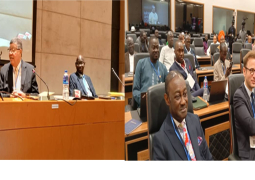
Professor Gomez was speaking on Tuesday at the official launching of the Gambia National Qualification Framework organised by the National Accreditation and Quality Assurance Authority (NAQAA).
It was held at the Sir Dawda Kairaba Jawara International Conference Centre in Bijilo, and brought together heads of government departments.
He said that the launch is a testament to government’s resolve in fostering a learning society where education is not a destination, but a lifelong journey.
The GNQF’s objectives recognise and value diverse forms of learning, including formal, non-formal, and informal learning in ensuring that everyone, regardless of their background, can gain recognition for their skills and knowledge.
The GNQF enhances the employability of graduates, ensuring that they possess the skills and competencies that employers require.
Prof Gomez stated that education has always been a cornerstone of national progress and the foundation upon which individuals build their futures, the means through which they unleash their potential and the vehicle through which societies advance.
“Through education, we prepare our citizens to be productive members of society, instill values of responsibility and citizenship, and drive economic growth and innovation,” he said.
“However, for education to serve as a true catalyst for progress, it must be relevant, responsive, and inclusive. It must align with our society's evolving needs and the global economy's demands. This is where the GNQF comes into play,” the Minister said.
He advanced that the GNQF represents a revolutionary approach to education and training, pointing out that it is a “comprehensive system that classifies and recognises qualifications across various levels and sectors, making it easier for individuals to understand and navigate their educational and career pathways.”
“It is about transparency, compatibility, and international recognition. With the GNQF, we have the opportunity to address several critical aspects of our education and workforce development,” he noted.
Minister Gomez revealed that the GNQF provides clear and transparent information about qualifications, making it easier for students, parents, employers, and educators to understand and assess the value of various qualifications.
He urged NAQAA to ensure that all existing and future qualifications are aligned with the GNQF. He added that a clear roadmap for implementing this framework should be developed immediately, and a monitoring mechanism should be implemented to ensure that Education and Training institutions meet the learners’ and Labour Market’s expectations, while urging all stakeholders to embrace this framework and its principles.
For his part, Alhaji Momodu Jallow, the chairman of the NAQAA Governing Council, said that the GNQF will ensure that educational institutions provide relevant, up-to-date and internationally recognised qualifications. He added that this would raise the bar for the students and help them to compete on a global scale.
“The GNQF will promote lifelong learning. It will create a seamless and flexible education system that allows individuals to acquire qualifications at their own pace, whether they are in school, in the workforce, or seeking to upgrade their skills,” Jallow said.




